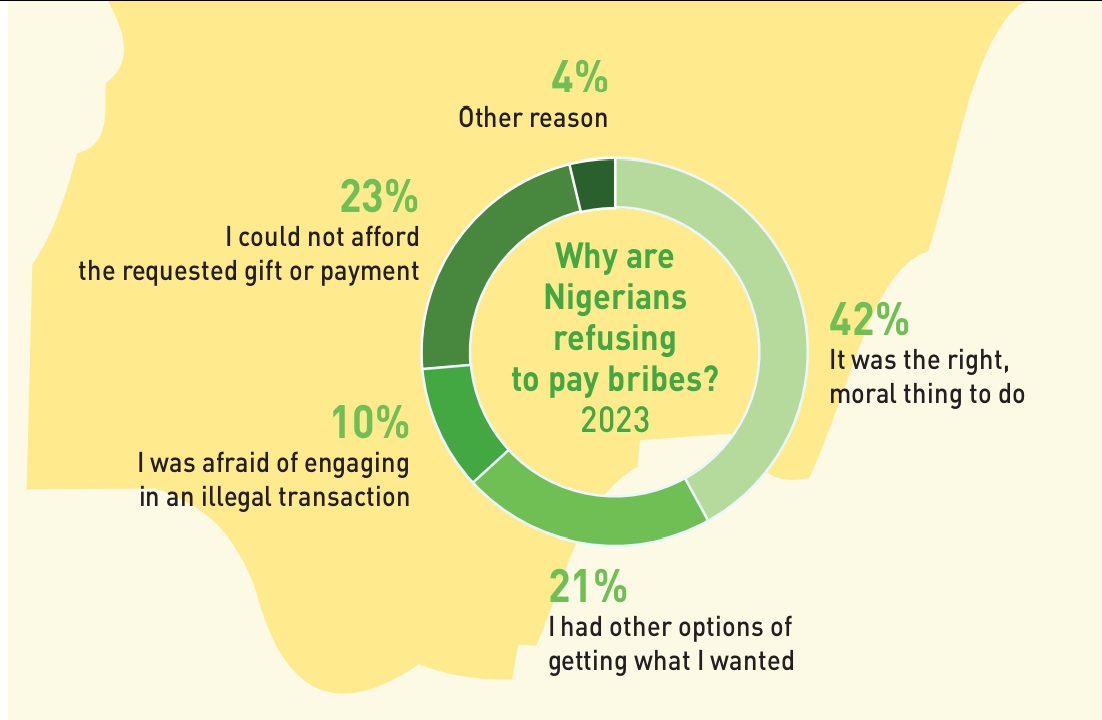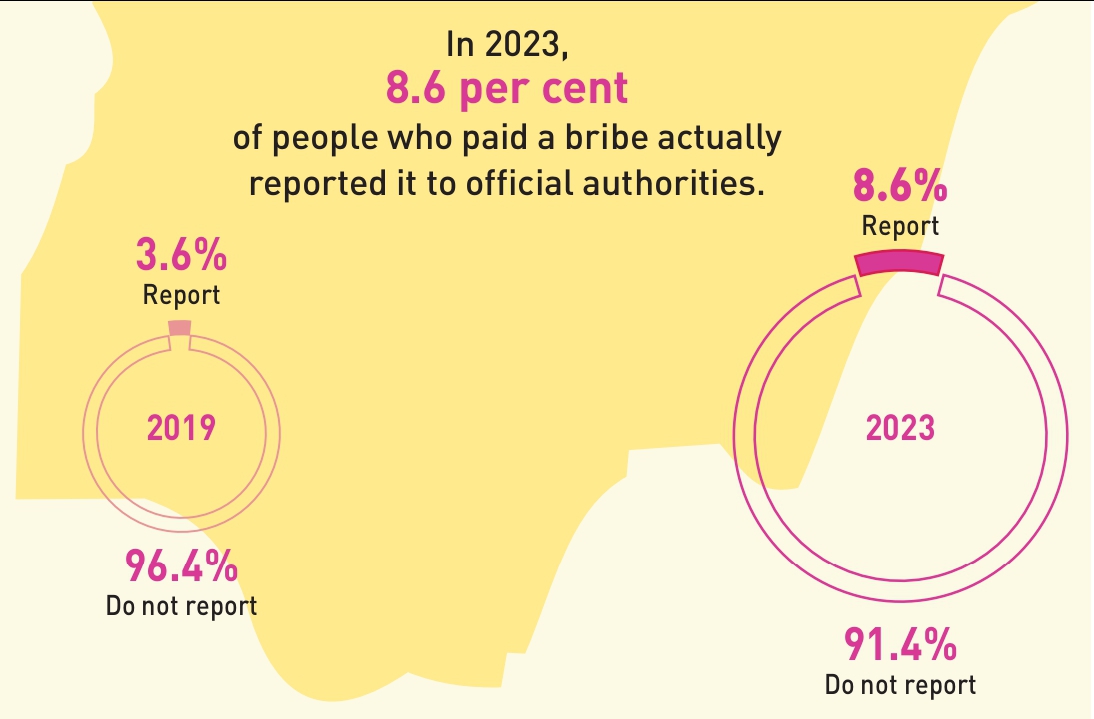By Emmanuel Oluwadola
“I believe things should be done the right way,” says *Mr Adewale, a Nigerian IT manager caught between the anvil and the hammer, forced to either reject cash bribes or run for his life.
In 2017, he developed software for local government agencies in Nasarawa State, discovering that some officials were exploiting the system to favour unqualified individuals. Attempting to rectify the issue, he introduced verification and validation exercises. However, he soon found himself under pressure, “Some local government officers came to bribe me with physical cash, asking me to turn a blind eye or falsify data and make sure their people remain on the platform and continue to benefit from it instead of the people who qualified for the program,” he recalled.
Adewale stood his ground and refused the money without being intimidated by the consequences. He said, “I rejected the bribe. I didn’t release the verification results for my safety until I left that local government. When I got back to my base, we released the results, reflecting the accurate list of those who truly qualified,” he said.
His courage symbolises hope in a country often misconstrued to be deeply entrenched in corruption. Contrary to the agelong misconceptions that Nigerians are inherently corrupt, more citizens are now rejecting bribery and speaking out against corruption. Adewale’s story is just one of the many under-reported accounts of Nigerians pushing for change and justice in their communities.
A police officer’s stand against corruption
Like Adewale, SP Daniel Itse Amah, a Nigerian police officer in Kano State, took a bold stand against bribery in 2022.
Amah rejected a $200,000 bribe from a principal suspect who attempted to cover up a crime after he (Amah) led the arrest and prosecution of one Ali Zaki, along with some others involved in an alleged armed robbery of ₦320.5 million.
70% of Nigerians refused to pay bribe in 2023 — UNODC survey
The survey by the United Nations Office on Drugs and Crime (UNODC) has shown that Nigerians are increasingly rejecting bribes and reporting corruption.
Titled “Corruption in Nigeria: Patterns and Trends”, the survey was conducted in partnership with Nigeria’s National Bureau of Statistics (NBS) with the support of the MacArthur Foundation and the Government of Denmark. The survey is the third of its kind in the country, and it is aimed at reflecting on Nigeria’s ongoing efforts to fight corruption.
The results of the survey show a significant downturn in bribery occurrences. An estimated 87 million bribes were paid in 2023, compared to 117 million in 2019.

Source: UNODC Survey, 2024.
The report indicated that 70% of Nigerians who were asked to pay bribes refused at least once in 2023. There was also a six per cent record of decline in the number of citizens who considered bribery as acceptable to speed up administrative procedures.
Also, the survey revealed that fewer Nigerians suffered negative consequences for rejecting bribes. The number of citizens who faced retaliation dropped from 49% in 2019 to 38% in 2023. This indicates a growing confidence in combating corruption with no fear of consequences.
Findings from the report further showed that the rise in the cost of living largely influences citizens’ decisions on bribery. Many Nigerians who refuse bribes do so because they believe it is morally right (42%), while others cite financial constraints (23%).
The percentage of public officials making direct bribery requests decreased from 60% in 2019 to 52% in 2023. Similarly, demands for bribes before rendering services dropped from 67% to 58%.
“The shift towards more retro-active bribing, combined with indirect requests by public officials, may suggest that public officials (in Nigeria) are becoming less assertive in asking for bribes and could indicate a gradual shift in the power relationship between officials and citizens to the benefit of the latter,” the report stated.

Source: UNODC Survey, 2024
Bribe reporting on the rise
The UNODC survey also shows that Nigerians are increasingly reporting bribery cases to official authorities while reporting rates to the police, anti-corruption agencies, and the media have increased.
“In 2023, out of all citizens who paid a bribe, 8.6 per cent reported their experience to an official institution capable of investigating or otherwise following up and acting on that report. This represents a marked increase in the bribery reporting rate since 2019 when it stood at 3.6 per cent.”
More formal investigations have been initiated as a result of bribe reports, rising from 16% in 2019 to 45% in 2023. Meanwhile, the percentage of reports that received no follow-up dropped from 25% to 17%.
“The share of citizens who reported a bribery instance but experienced no follow-up after reporting went down from 25 per cent to 17 per cent, as did the share of citizens who reported a bribery incident and were advised not to go ahead with the report (from 18 per cent to 14 per cent),” the survey revealed.
“I want peace of mind” – Ibrahim Sini’s story
Ibrahim Sini, another Nigerian who stood against corruption, turned down a ₦150 million bribe in 2023. A Lagos-based businessman offered him the bribe in exchange for a falsified police report that would allow him to flee the country.
According to Sini, he wanted peace of mind.
“I remember when the incident happened. The person in question asked me, ‘Do you want to be rich? This is an opportunity for you to be rich.
“So I said it depends on the kind of riches. I would like to have money so that I can lay my head down and sleep at night. I don’t want to have something that will make me think twice and run from one hole to another. So, I would like to do justice and have peace of mind.
“I decided to do the right thing so that I can have peace of mind and also stand to do what is right for myself, for my organisation, that is, the Nigeria Police and for the country at large,” he narrated.
It is not yet Uhuru – Expert
While progress has been made in rejecting corruption, there is more to be done for Nigeria to be fully cleansed of corruption, a socio-political analyst, Dr Gbenga Abimbola, stressed.
According to him, the UNODC survey that Nigerians are increasingly rejecting to pay bribes and reporting corruption is “too marginal to make a difference”.
Abimbola said that the concept of corruption should not be confined to the notion of when people steal or embezzle money, stressing that Nigeria needs a noticeable change where merit plays the key role in all processes, with qualified individuals having access to information, justice and government values whether or not the individuals have contact with authorities.
“I am not opposing the UNODC survey. If the survey says there is an improvement, fine; it is based on their empirical research, but the improvement, to me, is too marginal to make a difference.
“Corruption is not only when people steal or embezzle money but also when people are employed based on simplicity. When the unqualified are given opportunities because they know someone or have a godfather.
“We need noticeable improvement to the extent that merit will begin to play a key role in our processes and that people do not need to know anybody before they can access information and access justice and access government values,” he said.
Abimbola believes that Nigeria can be totally free from corruption if the government and citizens make up their minds, as well as play essential roles such as determination and action plan, first from the leaders. While citing John C. Maxwell, he said, “Everything rises and falls on the leadership.”
“Nothing is impossible; we can overcome corruption if we make up our minds. The leader in this context is the government. To fight corruption, the government must lead by example. They should uphold ethics and justice and obey the laws. When the Nigerian government doesn’t obey court rulings, it won’t allow corruption to go away very soon. The government should also hold the government accountable. Nobody should be above the law; everyone must be subject to the rule of law,” he said.
On the part of the citizens, Abimbola urged citizens to wake up and begin to demand justice and what is right, knowing that corruption has not allowed the Nigerian system to work. He advised citizens to continue to shun corruption and report cases to the anti-corruption agencies.
“There must be whistle-blowing. Citizens must volunteer information to anti-corruption agencies. These agencies are not witches and wizards. If citizens keep quiet when they see corruption, that means they (citizens) are also hiding and abetting corruption. It is not only the government, both government and citizens have roles to play,” Abimbola said.
Anti-corruption laws exist, but enforcement lags
According to the Chairperson of the International Federation of Women Lawyers (FIDA), Ondo State, Bolanle Olafunmiloye, with the positive trend recorded, the country still needs to do better, especially in terms of proper implementation of numerous anti-corruption laws put in place.
“Nigeria’s challenge as to corruption is not the dearth of anti-corruption laws but the implementation and enforcement of these laws. We lack the institutional autonomy and efficiency required to rid Nigeria of the large-scale corruption existing due to issues such as nepotism, ethnicism, tribalism, political interference, political will and religion, etc.,” she explained.
Olafunmiloye further highlighted some of these anti-corruption laws including the Money Laundering (Prevention and Prohibition) Act 2022; Advanced Free Fraud and Other Related Offences Act 2006; Economic and Financial Crimes Commission Act 2004; The Miscellaneous Offences Act; Independent Corrupt Practices and Other Related Offences Commission Act 2000; Code of Conduct Bureau and Tribunal Act ad under the 1999 Constitution; Nigerian Financial Intelligence Unit Act 2018; Public Procurement Act 2007; and Nigeria Criminal Code/ Nigeria Penal Code among others.
This legal practitioner stressed that the autonomy and efficiency of the established anti-corruption agencies, security agencies, as well as the judiciary are very critical to enforcing these laws in the country. She called for national discourse to understand corruption and what constitutes corruption to redesign Nigeria’s anti-corruption policies for more effectiveness.
“In my view, corruption is so embedded in our cultures and values and everyday life that we may need to have a national discourse to define what corruption means to us and what acts constitute corruption to redesign our anti-corruption policies to make them more effective. We will also need strong political will and judicial reforms to ensure justice is truly served (not just on social media platforms) and perpetrators are punished for their acts,” Olafunmiloye noted.
*Pleaded to be anonymous









